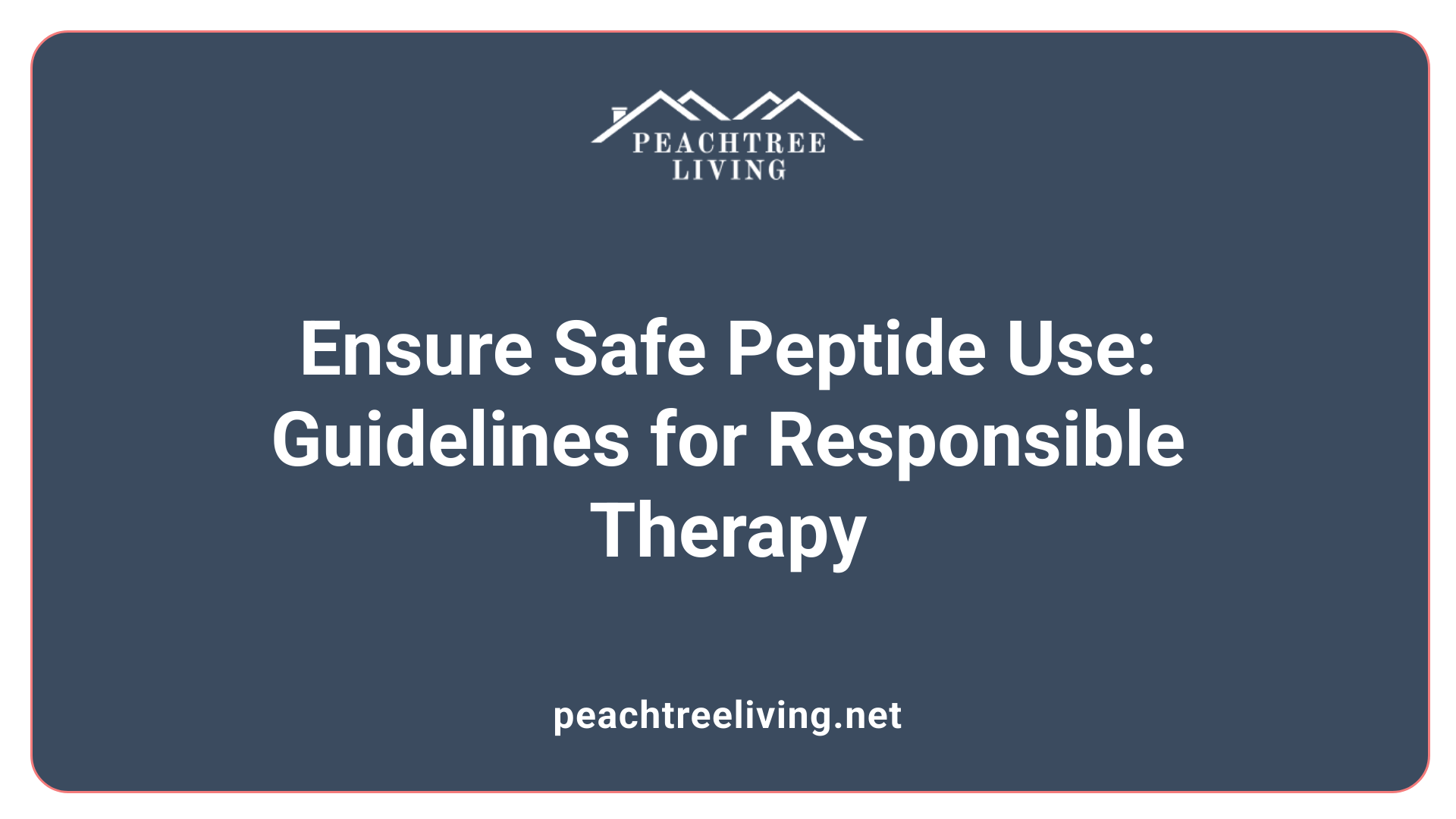Peptides and Their Role in the Body
Peptides are short chains of amino acids that serve as key biological messengers involved in hormone production, immune responses, and cell signaling. They play vital roles across various physiological systems, influencing everything from tissue repair to mood regulation. Despite their natural occurrence and diverse applications, questions about their safety, particularly regarding addiction, are increasingly relevant as their use becomes more widespread in medicine, fitness, and cosmetic treatments.
Peptides and Their Biological Functions

How do peptides affect the brain and overall health?
Peptides are small chains of amino acids that serve as messengers within the body, impacting a wide range of biological processes. In the brain, they influence neural communication by crossing the blood-brain barrier and interacting with neuropeptides involved in mood, appetite, and cognitive functions. This regulation can lead to neuroprotective effects, reduce inflammation, and modulate immune responses, thereby supporting mental health and physical resilience.
In addition to their natural roles, therapeutic peptides are being developed for various conditions, including neurodegenerative diseases, infections, and metabolic disorders. Their high specificity and ability to penetrate tissues make them promising candidates for medical treatments.
Most peptides used in medicine, research, and cosmetics are not addictive because they do not act directly on the brain’s reward systems. Their influence on mood and cognition depends on their interactions with specific neural circuits, which can be fine-tuned through controlled, responsible use.
What scientific mechanisms underlie peptide effects and addiction?
Peptides affect the brain primarily by modulating neural circuits involved in reward, stress, and social behaviors, especially within the prefrontal cortex and mesocorticolimbic pathways. Some neuropeptides, such as endorphins and enkephalins, naturally promote feelings of pleasure and relaxation, contributing to the reinforcement of certain behaviors.
Certain peptides like GLP-1, amylin, and ghrelin also influence addictive behaviors. GLP-1 receptor agonists, for example, can reduce drug rewards and decrease relapse risk, while amylin receptor activation has been shown to lessen alcohol and drug use. Conversely, ghrelin enhances drug rewards and seeking behavior.
The mechanisms involve complex signaling pathways that affect neuroplasticity—the brain’s ability to adapt and rewire itself—after exposure to addictive substances or behaviors. These peptides can influence the activity of interneurons and pyramidal neurons within the brain’s microcircuits, affecting mood, motivation, and reinforcement learning.
Research indicates that drug exposure can alter the density and function of these neuropeptides and their receptors within the prefrontal cortex, which may contribute to addiction and relapse tendencies. Understanding these mechanisms helps guide future treatments targeting these peptide systems.
Additional Information
| Aspect | Details | Implications |
|---|---|---|
| Peptide Function | Signaling, hormone regulation, immune response, tissue repair | Vital for maintaining health and homeostasis |
| Medical and cosmetic uses | Diabetes treatment (insulin), anti-aging, skin rejuvenation | Broad application spectrum |
| Addiction potential | Generally low, but certain peptides (e.g., opioids) can have addictive properties | Responsible use and medical oversight are critical |
| Risks of misuse | Organ damage, hormonal imbalances, allergic reactions, infections | Proper dosing and professional guidance are essential |
| Effects on mood and behavior | Neurotransmitter-like actions influencing reward and stress responses | Can support mental health or contribute to dependence |
| Neuropeptides involved in addiction | Oxytocin, vasopressin, CRF, orexin | Modulate behaviors related to drug-seeking and relapse |
Points to Remember
- The majority of peptides are safe and not addictive when used responsibly.
- Their interactions with brain circuits can influence addiction, but they do not inherently cause it.
- Misuse—such as overuse or unsupervised administration—raises health risks and can lead to dependence.
- Always seek guidance from healthcare professionals before using peptides, especially for therapeutic purposes.
- Ongoing research is exploring potential treatments targeting peptide systems for managing addiction and other health conditions.
Do Peptides Possess Inherent Addictive Properties?

Are there misconceptions about peptide addiction, and what facts should be known?
Many people believe that peptides, as biological molecules involved in critical functions like hormone production and immune responses, are inherently addictive. However, this is a misconception. Most peptides are naturally occurring chains of amino acids that play important roles in maintaining health and facilitating healing.
When used responsibly and under proper medical guidance, peptides do not cause addiction. Unlike substances that directly stimulate the brain’s reward pathways, such as drugs or alcohol, the majority of peptides do not interact with neurotransmitter systems in a way that encourages dependency.
It’s essential to understand that safe, therapeutic use of peptides relies on proper dosage, administration, and healthcare oversight. Education about their biological functions helps dispel myths, ensuring users understand that peptides primarily support bodily functions rather than promote reliance or addiction.
What are the risks and health effects of peptide misuse?
While peptides themselves are generally safe when used correctly, improper use or abuse can pose significant health risks. Overuse, high doses, or unregulated application can trigger various adverse effects, including allergic reactions and hormonal imbalances that may disrupt endocrine function.
Additionally, misuse can result in organ damage, particularly to the liver and heart, due to excessive or inappropriate intake. There's also a risk of infection at injection sites, such as abscesses or septicemia.
Prolonged or excessive use of peptides may interfere with the body’s natural hormone production, leading to mood swings, anxiety, fatigue, reduced sexual function, and possible damage to the pituitary gland. These health concerns emphasize the importance of responsible use.
To minimize these risks, it’s critical to follow guiding principles: always consult healthcare professionals, adhere to prescribed doses, source peptides from reputable providers, and monitor for side effects. Unregulated or self-prescribed use increases the likelihood of adverse health consequences.
Evidence supporting the limited addiction potential of most peptides
Research indicates that most peptides used in medicine, research, and cosmetics do not possess addictive properties. Unlike opioids or certain neuropeptides like tachykinins or orexins, standard therapeutic peptides do not activate the brain’s reward system in a way that fosters psychological or physical dependence.
Although some peptides, like opioids, have established addictive potential, the majority do not impact neurotransmitter pathways associated with reward and craving. This distinction is crucial for understanding their safety profile.
Further research into neuropeptides such as oxytocin, vasopressin, corticotropin-releasing factor (CRF), and orexin investigates their roles in addiction-related behaviors. These peptides influence neural circuits within the prefrontal cortex, affecting drug-seeking behaviors and addiction mechanisms, but this does not translate into inherent addictiveness when used as intended.
In conclusion, awareness of the non-addictive nature of most peptides, coupled with responsible use and professional oversight, plays a vital role in ensuring their safe application across therapeutic, cosmetic, and research domains.
Peptides in Addiction and Health Regulation
What roles do specific peptides like oxytocin, vasopressin, CRF, and orexin play in addiction and health?
Certain neuropeptides are deeply involved in the brain's regulation of addiction, stress, and social behaviors. Oxytocin and vasopressin are well-known for their roles in social bonding, emotional regulation, and managing stress. Oxytocin, often called the 'love hormone,' interacts with reward pathways in the brain and has been shown to reduce cravings and the likelihood of relapse in addiction treatment. Vasopressin influences social recognition and the body’s stress response, which can impact addiction vulnerability.
CRF (corticotropin-releasing factor) is centrally involved in the body's stress response. During withdrawal from addictive substances, elevated CRF levels can increase the risk of relapse by heightening stress and anxiety. Targeting CRF pathways is a promising approach in developing treatments for substance use disorders.
Orexin, another important peptide, primarily regulates arousal and alertness. It also influences reward-seeking behaviors linked to drug use, making it a significant player in addiction processes. Understanding how these peptides work can provide avenues for developing pharmacological therapies that modify their activity to help manage addiction and prevent relapse.
How do these peptides influence drug-seeking behaviors and stress responses?
Research indicates that these peptides modulate neural circuits involved in reward, stress, and social interaction.
- Oxytocin: Can diminish drug cravings by acting on brain reward systems, thus reducing the likelihood of relapse.
- Vasopressin: Affects social behaviors and might influence the social aspects of addiction.
- CRF: Elevated during withdrawal, heightening stress and anxiety, which may trigger relapse.
- Orexin: Stimulates arousal and reward pathways, promoting drug-seeking behavior.
Thorough understanding of these mechanisms allows scientists to explore targeted interventions that could alleviate withdrawal symptoms or diminish the reinforcing effects of addictive substances.
What are the potential therapeutic applications of these peptides in addiction treatment?
Harnessing the properties of these neuropeptides offers promising strategies for addiction medicine. For example, oxytocin administrations have shown potential in reducing cravings and promoting social behaviors that support recovery.
CRF receptor antagonists are being studied for their ability to mitigate stress-induced relapse, aiming to stabilize individuals in recovery.
Similarly, modulating orexin activity might decrease arousal and drug-seeking urges, aiding in maintaining abstinence.
While these treatments are still under research, their development could lead to more effective, targeted therapies for preventing relapse and managing addiction. Overall, these peptides hold significant potential in improving outcomes for individuals struggling with substance use disorders.
| Peptide | Function | Impact on Addiction | Therapeutic Prospects |
|---|---|---|---|
| Oxytocin | Social bonding, stress regulation | Reduces craving, relapse risk | Social behavior enhancement, craving reduction |
| Vasopressin | Social recognition, stress response | Modulates social behavior, stress resilience | Stress management, social connectivity in recovery |
| CRF | Stress response | Elevates during withdrawal, linked to relapse | Stress reduction, relapse prevention |
| Orexin | Arousal, reward-seeking | Promotes drug-seeking behaviors | Reduce arousal, inhibit compulsive drug use |
When used responsibly under medical supervision, understanding the roles these peptides can lead to novel treatments for addiction, emphasizing their potential in improving health outcomes.
Understanding Peptide Use and Treatment Cycles
How long should one stay on peptide therapy and what is the typical treatment cycle?
The duration of peptide therapy greatly depends on individual health goals, the specific type of peptide used, and how one responds to the treatment. For most medical or cosmetic purposes, peptide cycles typically last between 4 and 12 weeks. This period allows sufficient time for the peptides to exert their intended biological effects, whether for hormone regulation, tissue repair, or skin rejuvenation.
In some cases, especially with anti-aging or cognitive enhancement goals, treatment periods may extend over several months or even years. Healthcare professionals usually recommend cyclic treatments — that is, periods of active use followed by planned breaks. These cycles often involve 3 to 6 months of use, then a break to allow the body to recover and prevent dependency or hormonal imbalances.
Monitoring by healthcare providers during these cycles is crucial. Regular check-ups ensure that the treatment remains safe, effective, and tailored to the individual's needs. Adjustments to dosage or timing may be necessary based on response and any side effects.
Factors Influencing Treatment Length and Breaks
Several factors influence how long a person may stay on peptide therapy. These include the specific health condition, age, overall health status, and the presence of any underlying health issues. The type of peptide used also plays a role; some have longer half-lives or different mechanisms, affecting how frequently and for how long they should be administered.
Individual response to treatment is another key factor. Some patients might experience significant benefits early on, prompting longer or repeated cycles. Others might require shorter durations or more frequent breaks. The goal is always to maximize benefits while minimizing risks.
The Importance of Medical Supervision During Long-term Use
Proper medical oversight is essential, especially during extended or repeated use of peptides. Healthcare professionals guide proper dosing, administration methods, and cycle timing to prevent adverse effects such as hormonal imbalances, organ strain, or immune issues.
Long-term or off-label use without professional guidance increases the risk of complications, including allergic reactions, infections from injections, or interference with natural hormone production. Regular health assessments can detect early signs of adverse effects, allowing timely intervention.
In summary, responsible peptide therapy involves informed decisions, guided by healthcare providers, and adherence to recommended cycles. This approach ensures that patients benefit from peptide treatments while safeguarding their overall health.
Safety, Dosage, and Responsible Use of Peptides

What are the safety considerations and best practices for peptide usage?
When using peptides, it is important to prioritize safety at every step. Peptides can influence various biological functions, and improper use can lead to adverse health effects. Understanding potential immunogenicity, toxicity, and interactions with other medications is crucial.
Best practices for peptide administration include consulting healthcare professionals who specialize in peptide therapy. They can provide personalized guidance based on individual health status and treatment goals. Proper sourcing from reputable providers helps ensure the peptides' quality and prevents contamination.
To minimize risks, following recommended dosages is essential. Overuse can increase the likelihood of side effects such as allergic reactions, hormonal imbalances, or organ damage. Administering peptides using techniques that reduce infection risk, such as proper injection procedures, is also vital.
Advances in peptide technology include structural modifications like D-amino acid substitutions, which enhance stability and reduce immunogenicity. Employing targeted delivery systems ensures the peptides reach intended sites, reducing unintended effects.
Thorough pharmacokinetic evaluation during development and clinical use allows for adjustments in dosing and administration frequency, optimizing safety and efficacy.
In summary, safe peptide use hinges on informed decision-making, professional oversight, and adherence to established guidelines, thereby maximizing therapeutic benefits while minimizing health risks.
The Future of Peptides in Medicine and Research

What scientific mechanisms underlie peptide effects and addiction?
Peptides play a significant role in influencing the brain's reward and stress systems, which are central to addiction processes. They act as messengers that modulate neural circuits responsible for mood, behavior, and physical responses. In particular, peptides like oxytocin, vasopressin, corticotropin releasing factor (CRF), and orexin are active within the prefrontal cortex and other brain regions involved in regulating drug-seeking behavior and relapse.
These neuropeptides can bind to specific receptors, affecting cell signaling pathways that alter the activity of interneurons and pyramidal neurons. This regulation influences microcircuits that determine responses to stimuli, withdrawal states, and craving behaviors. Changes in the density of peptide receptors and levels of these peptides after drug exposure suggest that drug use can modify these systems, providing potential targets for future treatments.
Research continues to explore pharmacological manipulation of these neuropeptides. For example, therapies increasing oxytocin levels are being studied for their potential to reduce drug cravings and promote social bonding, which can help in recovery.
Emerging therapies targeting neuropeptides for addiction and health
Innovative treatments are emerging that harness the effects of neuropeptides to manage addiction and associated health issues. GLP-1 receptor agonists, originally developed for diabetes, are showing promise in reducing alcohol and drug intake by decreasing the reward sensations associated with substance use. Similarly, amylin receptor activation might lower alcohol and drug relapse rates.
The understanding of peptide interactions with brain circuits opens avenues for tailored therapies that could mitigate addiction by restoring balance within these complex signaling pathways, potentially reducing reliance on traditional addictive medications.
Advances in pharmacology and biotechnology
Advancements in biotechnology facilitate the creation of synthetic peptides with enhanced stability, targeted delivery, and minimal side effects. These improvements enable the development of precise medicinal peptides for various uses—from hormone regulation to immune responses and tissue repair. Better delivery systems, such as nanoparticle-based methods, improve bioavailability and reduce risks associated with injections.
Moreover, pharmaceutical research is focusing on designing molecules that can selectively target specific peptide receptors, avoiding unwanted side effects and improving therapeutic efficacy.
Research trends and ongoing clinical trials
Current research is centered on understanding the complex roles peptides play in addiction biology, including their influence on microcircuits in the brain’s prefrontal cortex. Clinical trials are investigating peptide-based drugs that could specifically prevent relapse or aid in recovery. The exploration includes testing neuropeptide receptor modulators, gene therapy approaches, and combination treatments involving peptides and existing medications.
By combining insights from neuroscience, pharmacology, and biotechnology, the future of peptide-based therapies holds promise for more effective, personalized approaches to addiction and broader health issues.
| Focus Area | Development Examples | Impact |
|---|---|---|
| Neuropeptide-based therapeutics | Oxytocin, GLP-1 receptor agonists | Potential to reduce cravings, relapse, and improve mental health |
| Delivery system innovations | Nanoparticle carriers, sustained-release formulations | Enhanced targeting and minimized side effects |
| Clinical research | Trials on peptide receptor modulators | Validation of safety and efficacy in diverse populations |
Conclusion: Myths, Facts, and Best Practices

Are there misconceptions about peptide addiction, and what facts should be known?
Most peptides do not possess inherent addictive properties. They are naturally occurring amino acid chains involved in vital biological functions like hormone production, immune responses, and cell signaling. While some peptides, such as opioids and tachykinins, can influence brain reward pathways and carry addiction risks, the majority used in medicine and cosmetics do not cause dependency.
Misconceptions often exaggerate the danger of peptide addiction, leading to unnecessary fear. Proper use, especially when guided by healthcare professionals, significantly reduces health risks. Learned education about responsible use, dosage, and administration is key to avoiding adverse effects.
The importance of professional guidance
Using peptides responsibly requires proper medical supervision. Healthcare providers can ensure correct dosing, monitoring, and minimize health risks. They help prevent issues such as hormonal imbalances, organ damage, or injection-related infections.
Furthermore, professional guidance helps recognize early signs of misuse or dependency. It also ensures that peptides are used for approved purposes, such as treating diabetes with insulin or supporting research and cosmetic applications.
Ongoing research and hope for new therapies
Research continues to explore peptides’ roles in treating addiction and other conditions. Investigations into neuropeptides like GLP-1, orexin, and others aim to develop new therapies for substance use disorders, offering hope for more effective and safer treatments.
The evolving understanding of peptides presents opportunities for innovative pharmacological approaches. As research progresses, the potential for tailored therapies targeting specific pathways in addiction and health management increases.
Most peptides are safe when used responsibly. Awareness, education, and professional oversight are fundamental to leveraging their benefits while minimizing risks. Continued research promises exciting new options for treating addiction and improving health outcomes.
Navigating the Complex Landscape of Peptides and Addiction
While peptides are versatile and beneficial biological molecules, their potential for addiction is limited when used responsibly. Most peptides do not inherently cause dependence; however, misuse, improper dosing, or unregulated products can lead to health risks. Scientific research underscores the importance of understanding their biological effects and mechanisms, especially regarding their roles in stress, reward, and social behaviors. A well-informed approach, guided by healthcare professionals, ensures safe therapeutic use while dispelling common misconceptions. Continued advancements in peptide research promise new frontiers in treating addiction and improving health, but responsible use remains paramount to harness their full benefits safely.
References
- Is Peptides Addictive? - Northstar Behavioral Health
- Can You Get Addicted To Peptides?
- Peptides and Addiction: Exploring the Potential Risks
- Can You Get Addicted To Peptides? - Prescott House
- Can You Get Addicted To Peptides? - Townsend
- Four hypothalamic peptides and their impact on drug-seeking ...
- Can You Get Addicted To Peptides?
- Strategies for Improving Peptide Stability and Delivery - PMC
- How Often Should You Get Peptide Therapy Treatments? - Drip Miami

